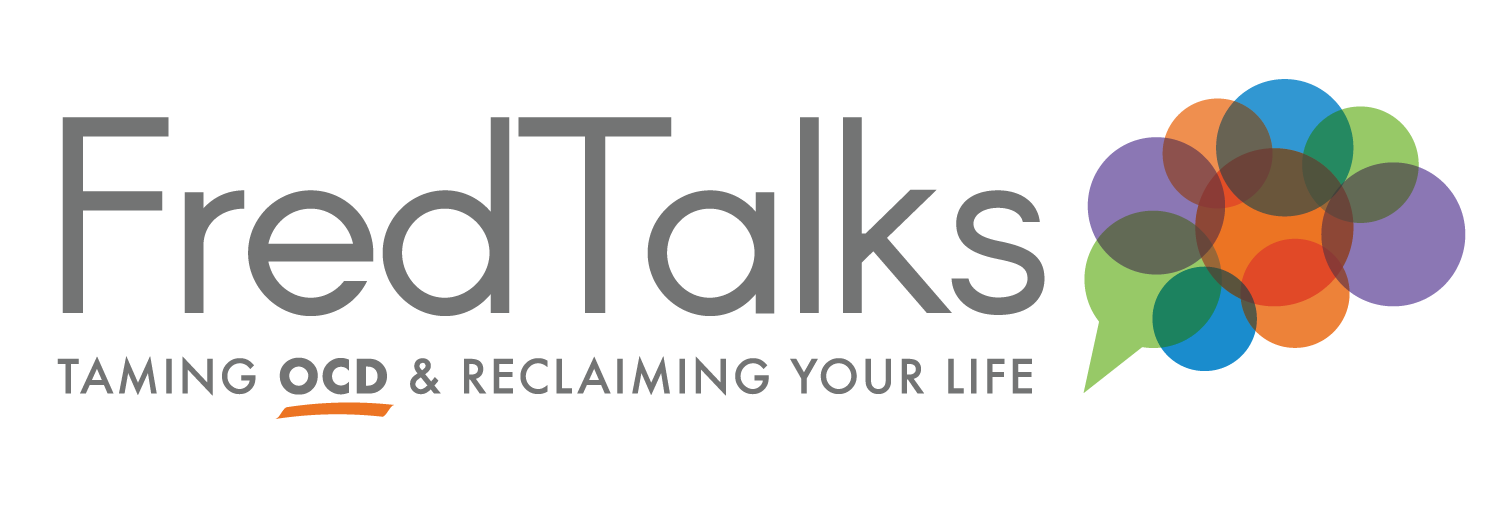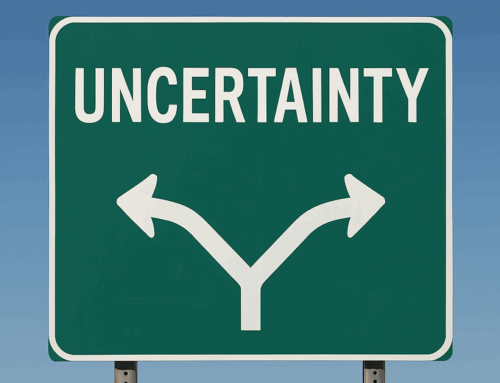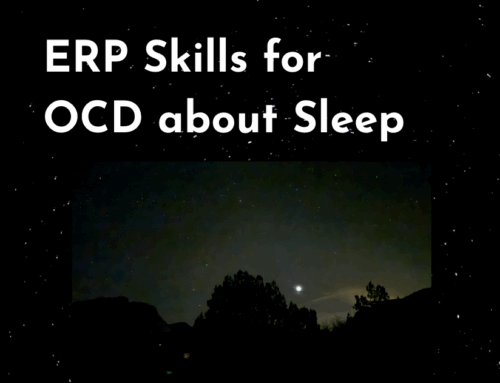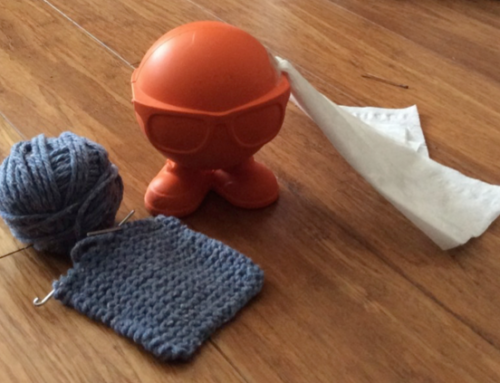 One of my all-time favorite quotes is “Discomfort is the price of admission to a meaningful life,” which Susan David, PhD said in her powerful TED talk “The gift and power of emotional courage.” and which I wrote about in one of my Psychology Today blog posts. I reference the quote here because I think it offers a roadmap for living an ERP lifestyle that can help keep your OCD recovery strong.
One of my all-time favorite quotes is “Discomfort is the price of admission to a meaningful life,” which Susan David, PhD said in her powerful TED talk “The gift and power of emotional courage.” and which I wrote about in one of my Psychology Today blog posts. I reference the quote here because I think it offers a roadmap for living an ERP lifestyle that can help keep your OCD recovery strong.
Why does an ERP lifestyle matter to your recovery?
ERP, or exposure and response prevention therapy, is the evidence-based therapy for OCD. As I wrote about in a previous post, to get the most benefit out of doing ERP, we want to do our ERP homework exercises relatively consistently. The more we practice facing our fears without doing compulsions, the more our brains learn they can tolerate the uncertainty that underlies OCD and the anxiety that accompanies it. And the less we practice, the more likely it is that our brains will go back to OCD’s way of thinking.
When you’ve finished formal therapy and are in a good place in your recovery, that doesn’t mean you’re not going to have an intrusive thought now and then. And sometimes your OCD is going to react to one of those thoughts and present you with an opportunity to do compulsions. (For more about this see my blog “Why There’s No Cure for OCD: But you can have an amazing, joyful life anyway.”) The more you create opportunities to practice ERP skills daily by acting like the content of intrusive thoughts doesn’t matter, otherwise known as an ERP lifestyle, the more likely you’ll be able to put your Shoulders Back and ignore OCD’s invitations, thus keeping your life your own.
Developing your own ERP lifestyle
 So how do you live an ERP lifestyle? Here’s a simple equation to help guide your practice:
So how do you live an ERP lifestyle? Here’s a simple equation to help guide your practice:
What’s meaningful to you + What bothered/s your OCD = Opportunities for an ERP lifestyle
For instance, say relationships are really important to you, but your OCD was always afraid of you saying something silly or embarrassing. ERP as a lifestyle is to take all the opportunities you can to talk to people: at the grocery store, at work, in your neighborhood, when you’re out being social. Then, remember what really pushed your OCD’s buttons when you were working on this in therapy and let that guide your actions:
- If OCD didn’t like sarcasm, throw a little in now and then.
- If it didn’t like you to end conversations abruptly, practice that when you’re pressed for time.
- OCD didn’t appreciate your sense of humer? Be sure to tell some jokes!
And then, do your best to not interact at all with OCD in your mind or do any other compulsions: instead, put your Shoulders Back and focus on what’s important to you, not getting the certainty that OCD wants (and that isn’t attainable anyway).
Examples of living a lifestyle of ERP
 I thought it might be helpful for me to share some examples of how I live a lifestyle of ERP to give you ideas of how you might incorporate ERP principles into your own life. Notice that for all of these I’m following the formula of “What’s meaningful to you + What bothered/s your OCD = Opportunities for an ERP lifestyle.”
I thought it might be helpful for me to share some examples of how I live a lifestyle of ERP to give you ideas of how you might incorporate ERP principles into your own life. Notice that for all of these I’m following the formula of “What’s meaningful to you + What bothered/s your OCD = Opportunities for an ERP lifestyle.”
- I live in an urban area, and I pick up trash around my neighborhood while walking my dog because I like to do my part to keep our community beautiful. Doing so has the added benefit of keeping my contamination OCD recovery strong. I also don’t pick up all the trash, so that I’m doing the exposure of leaving things incomplete.
- I speak French that is très imparfait (very imperfect) in my online French classes because I love learning how to speak this beautiful language. And every class is a new opportunity to continue habituating to making (lots of) mistakes in front of other people.
- Becoming an OCD therapist (which I wanted to do but my OCD was definitely against…see Chapter 13 of Fred for details…) and breaking my OCD’s Rule #1 by sharing my OCD story publicly made living an ERP lifestyle part of my career. However, I continue to look for opportunities to push myself out of my comfort zone in my job, such as the 6-hour Mastering the Subtleties of ERP for OCD workshop I’m giving live on April 11 on Zoom. I think the information I’m sharing could help both people who have OCD and therapists who treat it, and I’m doing it even though I’ve never given that long of a workshop online before (uncertainty about how it will go), sometimes I’m not that great with technology (letting go of control), and it’s been a while since I’ve given a workshop (bring on the anxiety!)
- My partner chose where we went on our end-of-the-year vacation, and I didn’t make any detailed itineraries of what we were going to do while we were there. At the end of the day the trip wasn’t about making a perfect plan or checking off everything we wanted to see or ensuring everything went smoothly. It was instead about enjoying spending time together in a beautiful area (which you can see in the photo above).
What I’ve learned in the almost 15 years of my OCD recovery is the more I live a lifestyle of ERP and the less I interact with OCD either physically or mentally, the fewer intrusive thoughts I have, and the more my life stays my own.
For further reading on ERP as a lifestyle
- Take a few minutes for a refresh on all things ERP. and remember that we want to:
- Act as though OCD is irrelevant (the essence of good exposure and response prevention therapy)
- Avoid “dead people’s goals” and discover that “discomfort is the price of admission to a meaningful life”
- Do ERP imperfectly because we all slip sometimes
- And if you’d like a longer refresher, spend some time with Dr. Reid Wilson and me as we discuss steps to maintaining OCD recovery goals
- Then start to live a lifestyle of ERP by
- Finding daily opportunities to open yourself up to discomfort, let go of control, and embrace uncertainty
- Learning how to slow down and enjoy more moments of your life, even when fear is present
- Pushing yourself out of your comfort zone and pursuing the life you want to live
- Connecting with others so you’re not going it alone
Learn more about taming OCD
To learn more about how I developed a lifestyle of ERP, see chapter 19, “A New Rule #1” in Is Fred in the Refrigerator? Taming OCD and Reclaiming My Life. Click here to purchase your copy.
Sign up for my Shoulders Back! newsletter to receive OCD-taming tips & resources, including notifications of new FredTalks, delivered every month to your inbox.
My blogs are not a replacement for therapy, and I encourage all readers who have obsessive compulsive disorder to find a competent ERP therapist. See the IOCDF treatment provider database for a provider near you. And never give up hope, because you can tame OCD and reclaim your life!







As an OCD – suspected netizen, this article on ERP lifestyle truly helped. The examples, like litter – picking, made it relatable. I like the idea of merging what I love with facing OCD triggers. It gives hope and nudges me to seek a pro ERP therapist. Will share with others.
Wow, this ERP lifestyle thing sounds actually doable! The idea of combining passions with facing fears is kinda genius. Definitely gonna try incorporating some of these ideas into my routine. Thanks for sharing!
Challenge Your Memory With The Chimp Test